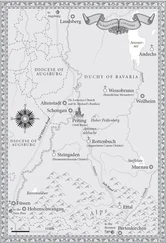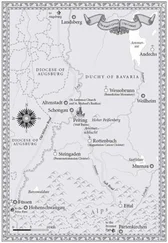Oliver Potzsch - The Beggar King
Здесь есть возможность читать онлайн «Oliver Potzsch - The Beggar King» весь текст электронной книги совершенно бесплатно (целиком полную версию без сокращений). В некоторых случаях можно слушать аудио, скачать через торрент в формате fb2 и присутствует краткое содержание. Жанр: Исторический детектив, на английском языке. Описание произведения, (предисловие) а так же отзывы посетителей доступны на портале библиотеки ЛибКат.
- Название:The Beggar King
- Автор:
- Жанр:
- Год:неизвестен
- ISBN:нет данных
- Рейтинг книги:5 / 5. Голосов: 1
-
Избранное:Добавить в избранное
- Отзывы:
-
Ваша оценка:
- 100
- 1
- 2
- 3
- 4
- 5
The Beggar King: краткое содержание, описание и аннотация
Предлагаем к чтению аннотацию, описание, краткое содержание или предисловие (зависит от того, что написал сам автор книги «The Beggar King»). Если вы не нашли необходимую информацию о книге — напишите в комментариях, мы постараемся отыскать её.
The Beggar King — читать онлайн бесплатно полную книгу (весь текст) целиком
Ниже представлен текст книги, разбитый по страницам. Система сохранения места последней прочитанной страницы, позволяет с удобством читать онлайн бесплатно книгу «The Beggar King», без необходимости каждый раз заново искать на чём Вы остановились. Поставьте закладку, и сможете в любой момент перейти на страницу, на которой закончили чтение.
Интервал:
Закладка:

Oliver Potzsch
The Beggar King
DRAMATIS PERSONAE
PRINCIPAL CHARACTERS
JAKOB KUISL, hangman of Schongau
SIMON FRONWIESER, son of the town doctor
MAGDALENA KUISL, the hangman’s daughter
ANNA-MARIA KUISL, the hangman’s wife
GEORG AND BARBARA, the hangman’s twin children
CITIZENS OF SCHONGAU
MARTHA STECHLIN, midwife
JOHANN LECHNER, court clerk
BONIFAZ FRONWIESER, Schongau town doctor
MICHAEL BERCHTHOLDT, master baker and alderman
MARIA BERCHTHOLDT, the master baker’s wife
RESL KIRCHLECHNER, the master baker’s maid
PEOPLE OF REGENSBURG
ELISABETH HOFMANN, the bathhouse owner’s wife and Jakob Kuisl’s sister
ANDREAS HOFMANN, Regensburg bathhouse owner
PHILIPP TEUBER, hangman of Regensburg
CAROLINE TEUBER, the Regensburg hangman’s wife
SILVIO CONTARINI, Venetian ambassador
NATHAN THE WISE, king of the Regensburg beggars
PAULUS MAMMINGER, Regensburg city treasurer
KARL GESSNER, Regensburg raftmaster
DOROTHEA BACHLEIN, brothel owner and prostitute
FATHER HUBERTUS, the bishop’s brewmaster
HIERONYMUS RHEINER, president of the city council
JOACHIM KERSCHER, president of the Regensburg tax office
DOMINIK ELSPERGER, doctor
THE BEGGARS
HANS REISER
BROTHER PAULUS
CRAZY JOHANNES
Sobald ein Soldat wird geboren,
sind ihm drei Bauern auserkoren.
Der erste, der ihn ernahrt, der andere,
der ihm ein schon Weib beschert,
Der dritte, der fur ihn zur Holle fahrt.
Whenever a soldier is born,
three peasants are chosen for him:
One to provide his fare,
another to procure him a lusty wench,
and a third one to go to hell in his stead.
— A VERSE FROM THE THIRTY YEARS’ WARPROLOGUE
SOMEWHERE IN THE MIDST OF THE THIRTY YEARS’ WAR NOVEMBER 1637 AD
The riders of the apocalypse wore blood-red leggings, tattered uniforms, and coats that fluttered in the wind like flags behind them. Their weapons were rusty and battered from killing, and their horses nothing but mangy old nags with dull, mud-encrusted coats. Silent, hidden behind a dense line of trees, the men stared at the sleepy village to which they would shortly bring death and destruction.
There were twelve of them, a haggard, hungry dozen. They had looted, murdered, and raped, again and again. Years ago they may have been men, but now they were just empty shells. A consuming madness flashed in their eyes. Their leader, a wiry young Frank in colorful mercenary garb, chewed on a frayed blade of grass and sucked in saliva through a space between his teeth. He saw smoke rising from the chimneys of the houses nestled along the forest edge and nodded with satisfaction.
“Looks like we may have found ourselves something here.”
He tossed the blade of grass and reached for the blood- and rust-stained saber at his side. The sounds of women and children rose up from below. The man grinned. “Looks to be women, too.”
A pimple-faced youth at his side giggled. He looked like a ferret, slightly stooped, clutching the reins of his scrawny nag with long, thin fingers. His eyes darted back and forth restlessly. He was not a day over sixteen, but the war had made an old man of him.
“You’re a real bastard, Philipp,” he rasped, running his tongue over his cracked lips. “You think of only one thing.”
“Shut up, Karl!” said a stout, potbellied bearded man on the left. He had the same straggly black hair as the Frank and the youth next to him. They were all brothers, with the same empty stare, as bitter and cold as a violent hailstorm in midsummer. “Didn’t Father raise you not to speak until spoken to?” the fat man growled. “So shut your mouth.”
“To hell with Father,” the youth replied. “And to hell with you, Friedrich.”
The fat man was about to reply, but the group leader beat him to it, his hand shooting out, seizing Karl by the throat so hard that his beady little black eyes bulged out of his head like giant pinheads.
“Don’t you ever bad-mouth our family again!” replied Philipp Lettner, the oldest brother. “Never again, do you hear? Or I’ll tear your hide to shreds, until you cry out to our dead mother. Do you hear?”
Karl Lettner nodded as his face swelled up and turned bright red. The older brother let him go, and Karl fell to the ground like a sack, coughing.
Philipp’s expression changed as he looked down, almost with pity, at his brother panting and gasping on the ground. “Karl, Karl,” he said, sucking on another blade of grass. “What can I do with you? Discipline, do you hear? Discipline is everything in war. Discipline and respect!” He bent down to his little brother and stroked his pimply cheek. “I love you as if you were a part of me, but if you blacken our father’s name once more, I’ll have to hurt you-bad. Do you hear?”
Karl remained silent, chewing his dirty fingernails and looking down at the ground.
“I said, do you hear?” Philipp Lettner demanded one more time.
“Yeah, I hear.” His little brother lowered his head meekly, though he clenched his fists in tight little balls.
Philipp grinned. “Good. Now we can finally get on with it and have a little fun.”
The other riders had watched the spectacle with interest. They acknowledged Philipp Lettner as their undisputed leader. Though not yet thirty years old, he was the most ruthless of the three Lettner brothers and had enough shrewdness to keep his place at the head of this gang. When, the year before, his men had started going out on their own unofficial raids in the course of the general campaign, Philipp Lettner had always managed to keep their young sergeant from getting wind of it. Even now, while the troops were supposed to be laid up in their winter headquarters, they found a way to make little excursions into the surrounding villages, though the sergeant had expressly forbidden it. They sold the booty to women who followed the army in wagons peddling goods, so the gang members always had money for food, drink, and whoring.
Today it looked as if they’d have an especially good haul. The village in the clearing, hidden behind dense firs and beeches, seemed almost untouched by the ravages of the Great War. In the setting sun the mercenaries could make out newly built barns and stables, and cows grazing in the lush meadows near the forest edge. The sound of a child’s flute rose from down below. Philipp Lettner spurred his horse, which whinnied, reared up, and then galloped off through the copse of blood-red beeches. The others followed their leader, and the killing began.
The first person to see them was a stooped, white-haired old man crouched in the bushes relieving himself. Instead of fleeing for cover in the forest, he stumbled back down the road toward the village with his pants hanging down. Philipp Lettner caught up with him and, with a single blow of his sword, severed the man’s right arm as he galloped by. Hooting and howling, the others ran over the old man, trampling his twitching body under their horses’ hooves.
The villagers were going about their usual chores when they saw the mercenaries approach. With loud cries the women dropped their pitchers and bundles and ran away in every direction, into the fields and forest. Giggling, young Karl aimed his crossbow at a boy of about twelve trying to hide among the broken stalks of a freshly harvested wheat field. The bolt hit the boy in the shoulder, and he fell to the ground without a sound.
Читать дальшеИнтервал:
Закладка:
Похожие книги на «The Beggar King»
Представляем Вашему вниманию похожие книги на «The Beggar King» списком для выбора. Мы отобрали схожую по названию и смыслу литературу в надежде предоставить читателям больше вариантов отыскать новые, интересные, ещё непрочитанные произведения.
Обсуждение, отзывы о книге «The Beggar King» и просто собственные мнения читателей. Оставьте ваши комментарии, напишите, что Вы думаете о произведении, его смысле или главных героях. Укажите что конкретно понравилось, а что нет, и почему Вы так считаете.












